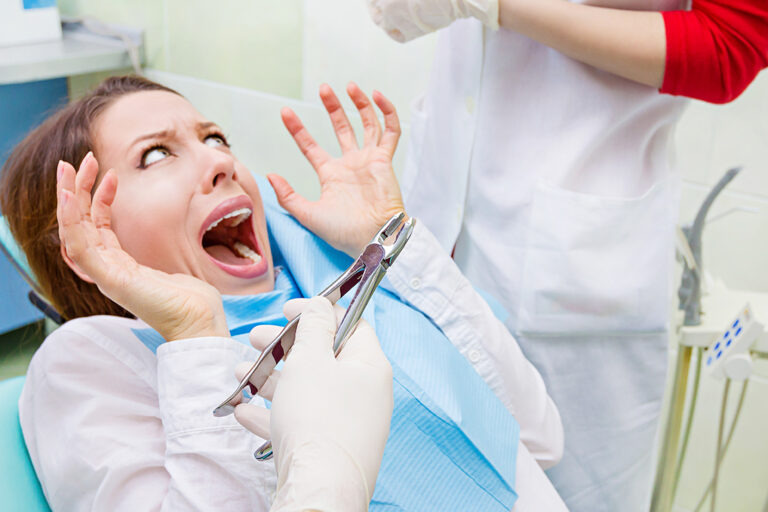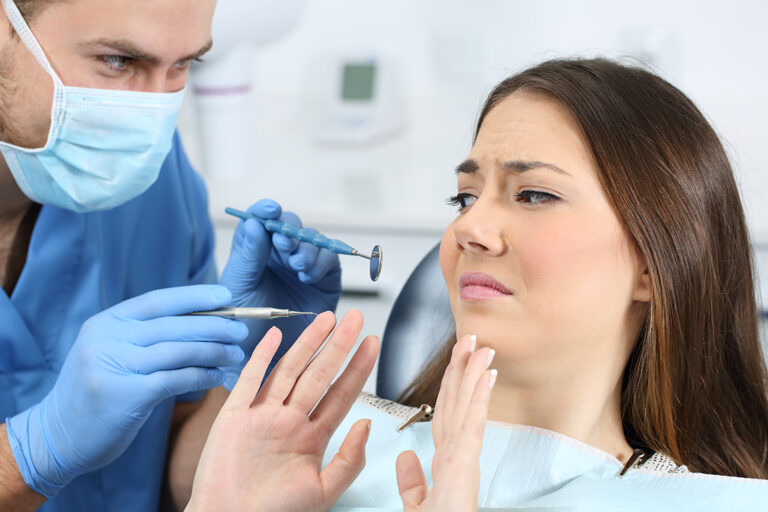What Helps With Dental Anxiety?
Dental Anxiety and Dental Phobia
If you or anyone you know are dealing with dental anxiety, dental fear, or dental phobia but is eager to put an end to it, this article’s for you.
While dental anxiety and dental phobia are not necessarily the same, they can cause similar symptoms and stop the person from going to the dentist and receiving dental care.
A person with dental anxiety gets nervous or stressed over upcoming dental visits and cannot stay calm in a dental setting. They may make excuses to avoid their dental appointments due to their dental fear or anxiety.
Unmanaged severe dental anxiety can lead to a more severe condition called “dental phobia”. A person with “dental phobia” has an irrational fear or extreme anxiety about going to the dentist, dental procedures, and dental offices.
Both conditions can delay necessary dental treatments and put a person’s oral health at risk. Some people with dental anxiety tend to put off their dental treatment due to severe anxiety. Some will only receive dental care if only they have to.
Severe anxiety or phobia of dentists and dental procedures can result in the complete avoidance of going to the dentist even if the person’s oral health is seriously at risk. However, there are ways that anxious patients can try to overcome their irrational ways.
First, let’s see what factors can cause a person to experience dental anxiety.
Causes Of Dental Anxiety
What Are The Causes of Dental Anxiety and Dental Phobia?
The root of dental anxiety varies from person to person.
Here are some of the most common causes of dental anxiety:
- Previous trauma to a person’s head or neck
- Fear of pain
- Fear of needles or injection
- Trust issues
- Generalised anxiety disorders
- Previous traumatic dental experiences
- Feeling uncomfortable with losing control
- Fear of helplessness
- Feeling scared that anesthesia may not work
- Claustrophobia
- Fear of anaesthetic side effects
- Feel self-conscious due to their unhealthy teeth or gums
Sometimes, people experience anxiety disorder due to having other health conditions like bipolar disorder, depression, or schizophrenia.
No matter the cause, dental anxiety needs to be managed because it can affect people and their oral health.

Signs and symptoms of dental anxiety and phobia
Dental anxiety has various symptoms and can affect people differently.
Take a look at some common signs of dental anxiety:
- Difficulty sleeping the night before their dental visit
- Experiencing stomachache, hyperventilating, or hot flashes
- Increased heart rate or sweating
- Trouble breathing either before the dental appointment or during the procedure
- Signs of a panic attack
- Decreased blood pressure
- Agitation, shaking, or crying
Coping With Dental Anxiety
How Do I Manage My Irrational Fear of Dentists?
The American Dental Association recommends that everyone arrange regular dental appointments every six months to ensure oral health and prevent dental disease.
Because putting off dental visits may worsen dental problems and increase the risk of requiring more complex treatments, it needs to be managed as soon as possible.
Moreover, poor dental health can affect your general health and lead to further health problems.
Some dental diseases, such as gum disease, can be reversed with early intervention.
By managing your dental anxiety and phobia, you can receive dental treatment and improve your oral health.
Here are our Brisbane dentist’s coping strategies to help anxious patients manage their dental anxiety or phobia.
Open Up To Your Dentist
First off, remember to inform your dental practitioner and the dental team about your dental fear or severe dental phobia. Dentists will typically have better ideas to help nervous patients stay calm in a dental chair.
Nervous patients can also ask their dentist any questions they might have before a dental procedure.
You can ask your dentist to explain every step of your dental treatment before beginning the process if you need to know everything.
You can let your dentist know if anything, in particular, triggers your dental anxiety. You and your dentist can also agree on a hand signal; you can raise your hand whenever you need a break or feel something’s not right.
Try Anxiety Relieving Medication
Some dentists may manage patients with dental anxiety by prescribing anxiety-relieving medication. These medications can help reduce dental anxiety and relieve fear and stress. Your dentist may ask you to take the anxiety-relieving medication one hour before dental appointments.
Avoid Ditching Your Dental Appointment
Postponing a dental appointment will not alleviate anxiety; it can add to your dental anxiety over time. Unmanaged dental anxiety can turn into “dental phobia” and make the situation even more challenging to control.
Have You Tried Deep Breathing and Muscle Relaxation Techniques?
Meditation and deep breathing may help reduce muscle tension and can help people relax in many stressful situations like a dental setting.
You can try muscle relaxation techniques while in a dental chair or even before your dental treatments. Try to close your eyes and pay attention to your breathing; inhale and exhale slowly. Try to relax all parts of your body and release tension from head to toe.
Repeating positive affirmations during dental treatment may also help reduce dental anxiety and phobia.
Bringing A Frind May Help
You may feel less anxious if you know you have the support and companionship of a friend in a dental setting. Even if they cannot be with you in the dental chair, feeling their presence may help you relax during a dental procedure.
How About Hypnosis?
Hypnosis can sometimes be used for patients who fear going to the dentist. It might help reduce their dental anxiety and enhance their comfort during dental treatment.
Since hypnosis may lower blood pressure, patients may experience faster recovery time.
Distraction May Do The Trick
Ask your dentist if you can listen to some music or perhaps watch TV. Distracting yourself and not focusing on the procedure, the equipment, or your anxiety or phobia might help relieve dental anxiety.
Try Guided Imagery
Guided imagery is a simple meditation technique that releases tension in stressful situations. You can use this relaxation technique during dental appointments to help you manage your dental fear. Try to shift your focus from fear, stress, or anxiety during a dental visit and go to your happy place in your mind instead.
Use your imagination and think about whatever makes you relaxed or happy. Think about a desirable dreamy place you would like to visit. Try to visualise every detail, and you will see that your body will respond to your comforting thoughts and helps you stay calm. You can also think about pleasant past memories to help you reduce dental anxiety.
Arrive Early At The Dental Clinic
Arriving early or on time at the dental office can also be beneficial since your mind and body will have extra time to relax. Communicating with the dental staff and sharing your concerns may also reduce your dental anxiety.
You May Need Conscious Sedation or General Anesthesia
You have tried all these coping strategies and remain anxious? Sedation dentistry may do the trick.
Dentists may manage patients with high dental fear or severe dental anxiety with conscious sedation (twilight sedation), nitrous oxide (laughing gas), or general anaesthesia.

How Can Dental Anxiety Affect Your Oral Health?
Why Is It Important To Overcome Dental Phobia
Addressing dental anxiety will help you receive dental care and promote your oral health. Good oral health can prevent dental diseases such as dental decay, cavities, gum disease, and other health conditions.
Regular dental checkups will allow your dentist to spot any dental problems at their early stages and decrease the risk of more complex treatments.
Dental Sedation
Sedation Dentistry
Dental sedation or sedation dentistry involves using sedative techniques and medication to manage patients’ dental anxiety.
Nitrous Oxide
Nitrous oxide involves the nervous patients’ inhaling the gas through a nose mask to feel less anxious. Nitrous oxide or laughing gas is a conscious sedation technique with no severe side effects. Laughing gas is a safe, low-impact sedative with pain relief properties and can be used for adults and children.
Oral Sedation
Oral sedatives provide the patients with a deeper level of relaxation.
Sedative medication will be given to the patient in the form of a pill, typically “Halcion”.
The patient should take the pill usually about an hour before their dental appointment to feel relaxed. Patients will be awake but typically drowsy. Sometimes the dental sedationist decides to increase the drug dose if patients remain anxious. In that case, they may fall asleep during the procedure.
IV Sedation (twilight sedation)
A dental sedationist or an anaesthetist will administer IV sedation or intravenous sedation. The patient receives the sedative drugs through their vein. Patients with high dental anxiety will benefit from this method of sedation. They will be sleepy but not completely asleep during treatment, as is the case with sleep dentistry in Brisbane. The patient’s blood pressure, heart rate, and oxygen levels will be continuously checked.
IV sedation can be carried out at a dental practice in Brisbane with additional equipment or in a hospital setting.
General Anesthesia
Patients will have to receive oral care under general anesthesia in some particular cases. General anaesthesia will make the patient unconscious for the entire procedure.
Patients will not be responsive to any physical or verbal stimulation. General anesthesia is typically administered in a hospital setting or a fully-equipped healthcare centre.
Pure Dentistry
Would you like your future dental visits to be pleasant and anxiety-free? Visit our dental office in Brisbane. Enjoy a calm and peaceful dental experience in our dental clinic, Pure Dentistry.
Receive oral care, and improve your smile in a comfortable, peaceful dental setting. We offer dental sedation in the form of general anesthesia and nitrous oxide.
Book Online or call us on Pure Dentistry at 0733434869.




































